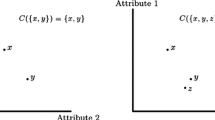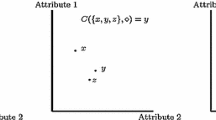Abstract
The paper considers decision contexts in which the set of alternatives from which choices have to be made (the ‘menu’) may convey information about the desirability of these alternatives. Our analysis is motivated by the fact that in specifying an appropriate description of a choice situation an outside observer always has to neglect some ‘dimensions’ of the decision problem. The central claim is that properties of observed behaviour may depend crucially on the neglected dimensions even when their influence is arbitrarily small. Specifically, we prove the following result. Suppose that in a discrete choice model an agent's beliefs about the ‘quality’ of the available alternatives depend on the specific menu to choose from. Then, even when the difference in beliefs given different menus is arbitrarily small (but positive), any practicable description of the decision situation necessarily implies that cyclic choices will be observed. The result suggests that transitivity - as a condition on observable behaviour - is rather questionable in any context where one cannot completely exclude the possibility that menu-dependent information may play some role.
Similar content being viewed by others
References
Anand, P.: 1990, ‘Interpreting Axiomatic (Decision) Theory’, Annals of Operations Research 23, 91–101.
Anand, P.: 1993a, ‘The Philosophy of Intransitive Preference’, Economic Journal 103, 337–346.
Anand, P.: 1993b, Foundations of Rational Choice under Risk, Clarendon Press, Oxford.
Bar-Hillel, M. and Margalit, A.: 1988, ‘How Vicious are Cycles of Intransitive Choice’, Theory and Decision 24, 119–145.
Barrett, C.R. and Pattanaik, P.K.: 1989, ‘Fuzzy Sets, Preference and Choice: Some Conceptual Issues’, Bulletin of Economic Research 41, 229–253.
Barrett, C.R., Pattanaik, P.K. and Salles, M.: 1990, ‘On Choosing Rationally when Preferences are Fuzzy’, Fuzzy Sets and Systems 34, 197–212.
Bell, D.: 1982, ‘Regret in Decision Making under Uncertainty’, Operations Research 20, 961–981.
Fishburn, P.C.: 1982, ‘Non-Transitive Measurable Utility’, Journal of Mathematical Psychology 26, 31–67.
Fishburn, P.C.: 1984a, ‘SSB Utility Theory: An Economic Perspective’, Mathematical Social Sciences 8, 63–94.
Fishburn, P.C.: 1984b, ‘SSB Utility Theory and Decision-Making under Uncertainty’, Mathematical Social Sciences 8, 253–285.
Fishburn, P.C. and La Valle, I.H.: 1988, ‘Context-Dependent Choice with Nonlinear and Nontransitive Preferences’, Econometrica 56, 1221–1239.
Grether, D.M. and Plott, C.R.: 1979, ‘Economic Theory of Choice and the Preference Reversal Phenomenon’, American Economic Review 69, 623–638.
Hurewicz, W. and Wallman, H.: 1948, Dimension Theory, Princeton, Princeton University Press.
Loomes, G. and Sugden, R.: 1982, ‘Regret Theory: An Alternative Theory of Rational Choice under Uncertainty’, Economic Journal 92, 805–824.
Luce, R.D. and Raiffa, H.: 1957, Games and Decisions, New York, Wiley.
May, K.O.: 1954, ‘Intransitivity, Utility, and the Aggregation of Preference Patterns’, Econometrica 22, 1–13.
Ovchinnikov, S.V.: 1981, ‘Structure of Fuzzy Binary Relations’, Fuzzy Sets and Systems 6, 169–195.
Roubens, M. and Vincke, P.: 1987, ‘Fuzzy Preferences in an Optimization Perspective’, in J. Kacprzyk and S. Orlovsky (Eds.), Soft Optimization Models Using Fuzzy Sets and Possibility Theory, Reidel, Dordrecht.
Sen, A.K.: 1973, ‘Behaviour and the Concept of Preference’, Economica 40, 241–259.
Sen, A.K.: 1993, ‘Internal Consistency of Choice’, Econometrica 61; 495–521.
Tversky, A.: 1969, ‘Intransitivity of Preferences’, Psychological Review 76, 31–48.
Author information
Authors and Affiliations
Rights and permissions
About this article
Cite this article
Kirchsteiger, G., Puppe, C. Intransitive choices based on transitive preferences: The case of menu-dependent information. Theor Decis 41, 37–58 (1996). https://doi.org/10.1007/BF00134115
Issue Date:
DOI: https://doi.org/10.1007/BF00134115




